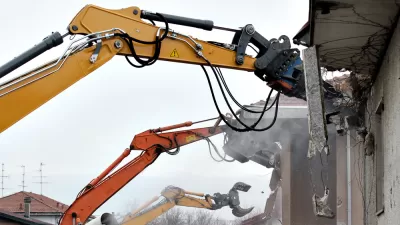Detroit's aggressive blight reduction strategy, to demolish vacant homes by the thousands, is coming under scrutiny for rising costs. The FBI and the U.S. Inspector General are investigating.

Matt Helms reports on the latest details of an expanding federal investigation in Detroit into increased costs in the city's demolition program. First, for those who missed it:
The FBI is assisting the U.S. Special Inspector General for the Troubled Asset Relief Program, or SIGTARP, in an investigation of bidding and price hikes for tearing down blighted homes in Detroit after costs rose from $8,500-$10,000 per home under former Mayor Dave Bing to an average at one point of $16,400 in 2014 under the Duggan administration's aggressive revamp of the city's demolition program.
Detroit has received more than $170 million from the TARP Hardest Hit Fund, dating back to 2013 and as recently as October 2015.
The Detroit demolition program already completed a review with the Michigan State Housing Development Authority over the rising costs of demolition, finding that costs rose an understandable amount when the Detroit Land Bank Authority and the Detroit Building Authority strengthened its contractor selection process. According to the article by Helms, Mayor Mike Duggan predicts that the federal government will reach the same conclusion. Helms details more about the city's business practices early in the demolition program and what's known so far about the emerging federal investigation.
For more detail of the investigation, see also an article by Joe Guillen and Tresa Baldas, who reported on the FBI joining the investigation earlier in May. Matt Helms and Joe Guillen were also reporting on the rising costs of the demolition program in October 2015.
FULL STORY: Duggan: I'm OK with feds investigating blight program

Planetizen Federal Action Tracker
A weekly monitor of how Trump’s orders and actions are impacting planners and planning in America.

Congressman Proposes Bill to Rename DC Metro “Trump Train”
The Make Autorail Great Again Act would withhold federal funding to the system until the Washington Metropolitan Area Transit Authority (WMATA), rebrands as the Washington Metropolitan Authority for Greater Access (WMAGA).

The Simple Legislative Tool Transforming Vacant Downtowns
In California, Michigan and Georgia, an easy win is bringing dollars — and delight — back to city centers.

The States Losing Rural Delivery Rooms at an Alarming Pace
In some states, as few as 9% of rural hospitals still deliver babies. As a result, rising pre-term births, no adequate pre-term care and "harrowing" close calls are a growing reality.

The Small South Asian Republic Going all in on EVs
Thanks to one simple policy change less than five years ago, 65% of new cars in this Himalayan country are now electric.

DC Backpedals on Bike Lane Protection, Swaps Barriers for Paint
Citing aesthetic concerns, the city is removing the concrete barriers and flexposts that once separated Arizona Avenue cyclists from motor vehicles.
Urban Design for Planners 1: Software Tools
This six-course series explores essential urban design concepts using open source software and equips planners with the tools they need to participate fully in the urban design process.
Planning for Universal Design
Learn the tools for implementing Universal Design in planning regulations.
Smith Gee Studio
City of Charlotte
City of Camden Redevelopment Agency
City of Astoria
Transportation Research & Education Center (TREC) at Portland State University
US High Speed Rail Association
City of Camden Redevelopment Agency
Municipality of Princeton (NJ)




























